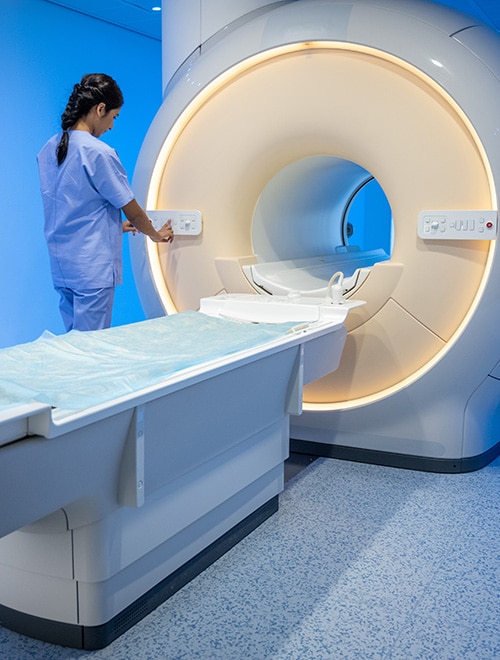- 5 min read
Prostate cancer staging and grading
Once you are diagnosed with cancer, your doctor or specialist will establish your cancer stage (check if your cancer has spread), and they will also grade your cancer to check if your cancer is likely to grow or spread. This means finding out if your cancer is high-risk and requires urgent treatment, or low-risk and may only need monitoring. These processes help to determine the next steps for you.
Staging your prostate cancer
Your doctor will classify your cancer into one of four stages (I, II, III, IV or 1,2,3,4) using a standard international system (TNM system), depending on whether your cancer has stayed within your prostate (localised) or spread outside of your prostate (advanced). This is based on your clinical and imaging test results and helps your doctor determine your risk level and potential treatment options.
Find out more about the stages of prostate cancer, how your cancer is staged and what the different stages mean for you.
Grading your prostate cancer
Grading your cancer gives an indication of how aggressive your cancer is – how likely it is to grow and spread quickly. The only way to be certain that you have cancer is by having a biopsy. This is where a small sample of prostate tissue is taken and sent to a pathologist. The pathologist will examine the tissue and grade your cancer. Cancers are graded with a Gleason score or a newer more accurate ISUP Grade group. Grading can help assess your level of risk and guide treatment options.
Find out more about Your Gleason Score & ISUP Grade and learn how your cancer is graded and what the different grades mean for you and your cancer.
PSMA PET/CT in prostate cancer
A PSMA PET/CT scan is a newer, specialised imaging test that is changing the way prostate cancer is detected in the body. This scan uses a combination of two different technologies with a small amount of radioactive material to create an image which shows cancer in the prostate as well as anywhere in your body where it may have spread to. It is highly sensitive compared to CT and bone scans and is often used for people diagnosed with high-risk prostate cancer.
Learn more about the role of PMSA PET/CT in prostate cancer and whether this scan may be beneficial for you.
Genetics and prostate cancer
The connection between family history and prostate cancer risk is well-established. However, our understanding of how inherited genes and genetic factors influence prostate cancer diagnosis and disease outcomes is not well understood.
Ongoing research, newer technology and advanced genetic testing methods are paving the way for precision medicine (or individualised medicine). Precision medicine is when your doctor looks at the unique genetic changes and other characteristics of your cancer and designs a treatment that is specific for you.
What are genes?
Genes are the basic unit of heredity passed from biological parents to children. Genes, made up of DNA, are found in most of the cells in your body. They contain the information needed to build and maintain your body.
Genetic risks of prostate cancer
Family history strongly influences prostate cancer risk due to gene mutations, or changes in genes and DNA, being passed down from generation to generation. Your risk of getting prostate cancer is partly determined by which genetic changes you have inherited.
Find out more about the genetic risks of prostate cancer
What are gene mutations?
Mutations are changes in your gene structure, which also changes their function in the body. Many gene changes are harmless, but some can increase your risk of diseases like prostate cancer. But having a gene mutation does not mean your will get cancer for sure, only that you have a higher risk of getting the disease.
Inherited gene mutations are called germline; acquired mutations are called somatic
Gene mutations that are inherited from your parents are called germline mutations. But your genes can also develop mutations over your lifetime due to your environment, lifestyle or other factors. These acquired mutations, called somatic mutations, are often found in cancer cells.
BRCA genes and their mutations
We all have genes called BRCA genes (BReast CAncer genes). Mutations in these genes are strongly linked with prostate cancer risk (and others such as breast and ovarian cancer). These mutations can be inherited or acquired. Having these mutations, or knowing someone in your family with them, increases your risk of prostate cancer and may affect your testing and treatment options.
Follow the links to learn more about these genes, their mutations and the risks associated with them.
BRCA Genes & Prostate Cancer
BRCA gene mutations and their risks in prostate cancer
Genetic testing for better outcomes
Earlier and faster detection and diagnosis is often the key to successfully treating cancer. If you have a family history of cancer, genetic testing may help determine your risk of getting the disease. Knowing your risk will increase the chances of finding cancer early and treating it before it has a chance to spread outside of your prostate and become more difficult to treat
What is precision medicine?
Precision medicine uses specific information from testing your genes, proteins and/or examining other characteristics of your cancer cells to understand your unique cancer better. This can help your doctor decide on the best treatment for you.
Research into this area is evolving, but recent breakthroughs in precision medicine mean that men with BRCA gene mutations can be more effectively treated with medicines that target these types of prostate cancers. As research and clinical studies teach us more about the different types of changes affecting prostate cancer, we can look forward to further improvements in treatments and better outcomes for men with this disease.
What are the different types of gene testing in prostate cancer?
- Genetic testing – looks for certain gene mutations, including BRCA gene mutations, which may increase your risk of prostate cancer
- Genomic testing – looks at your genes in cells taken directly from your prostate cancer to predict if your cancer is likely to spread (low or high risk)
- Biomarker testing – uses genes and other molecules (biomarkers) to help detect cancer and assess prostate cancer risk
Follow the links to learn more about these tests:
What is genetic testing?
Genomic Testing & Biomarkers
Testing for genes and other markers in prostate cancer
Before considering any of the gene-based tests, talk to your doctor or reach out to a PCFA nurse, as they can help you understand whether this testing is appropriate or available to you.
Genetics and genomics – what’s the difference?
Genomics is the study of our DNA and all our genes (also called our genome), specifically how genes behave, how they interact with other genes and our environment, and if they play a part in certain diseases. While genetics is the study of inherited genes that are passed down from one generation to the next.
Key points
- Prostate cancer grading and staging can help tell you if your prostate cancer has spread outside of your prostate or if it is likely to grow and spread quickly
- Staging uses the TMN system, giving a stage I, II,III or IV (1,2,3 or 4) to your cancer
- Grading is done after a biopsy and gives your cancer a Gleason score or ISUP Grade grouping
- The newer PSMA PET/CT scan detect cancer and cancer spread more accuratey than CT and bone scans combined
- Genetics and family history play a large role in prostate cancer risk
- Certain inherited or accquired genetic mutations can increase the risk of cancer (including BRCA gene mutations)
- Testing our genetic material is an advancing field and will lead to more individualised medicine, also called precision mediicine, in the future
- There are three different types of gene testing that can help improve the detection, diagnosis and individual targeting of treatment in prostate cancer






